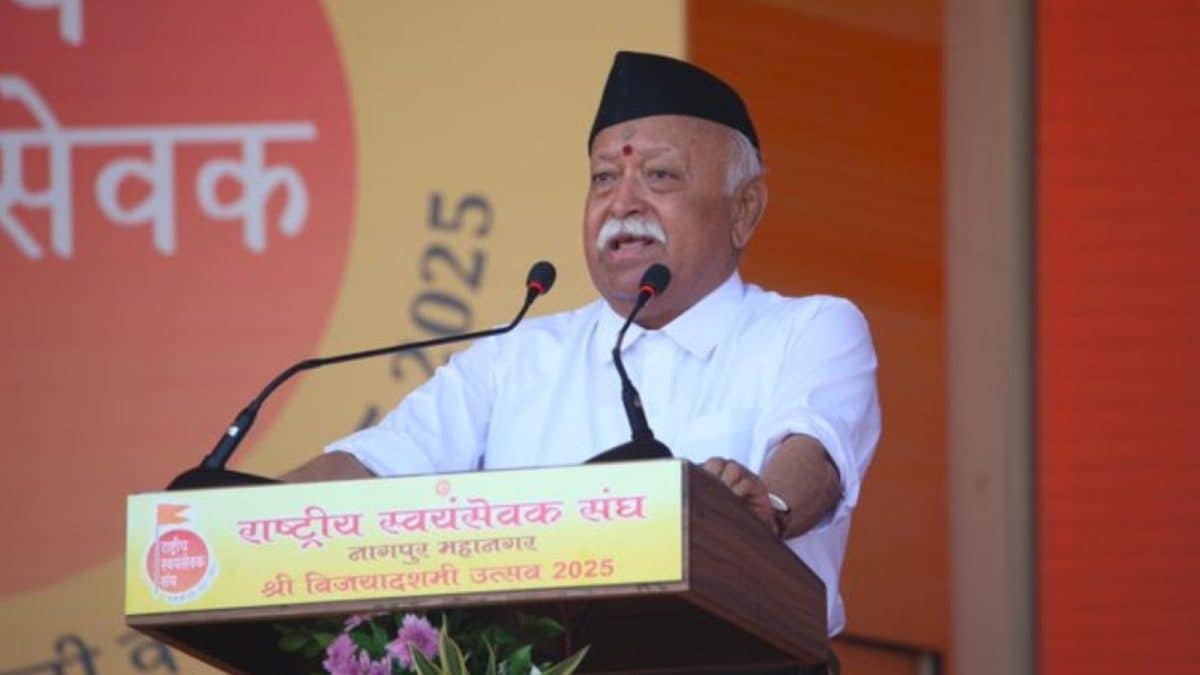Last Updated:
The address was a masterclass in balancing ideological reflection with practical guidance and a reminder that the nation is a mirror of the values its people choose to live by

Every thread of Mohan Bhagwat’s speech circled back to a singular principle: India’s future is shaped as much by its citizens as by its institutions. (X @RSSorg)
In a sweeping but sharp address that bridged global economics, regional unrest, and national responsibility, Rashtriya Swayamsevak Sangh (RSS) chief Mohan Bhagwat offered a vision of India rooted in self-reliance, cultural unity, and societal discipline.
Bhagwat was speaking in Nagpur to commemorate the centenary year of the RSS in presence of national and international guests from all strata of society. His speech, at once reflective and directive, mapped the challenges facing the nation, while also underlining the role of citizens in shaping its destiny.
Recommended Stories
Self-Reliance Over Coercion
Opening with the global stage, Bhagwat highlighted the impact of America’s new tariff policies. While such measures serve American interests, their consequences ripple worldwide, he noted.
In a striking moment, he called out America in front of editors of international media, including the Washington Post and the Wall Street Journal, to probably ensure his message reached the audiences concerned.
“No nation can survive in isolation,” he warned. Interdependence is inevitable, but it must never translate into compulsion, he added.
For India, engagement with the world must be by choice, not a necessity or reflection of helplessness. Political, economic, and diplomatic relations should flow from strategic willingness rather than coercion. Self-reliance, Bhagwat stressed, is not an abstract ideal, it is a strategic imperative.
Grammar of Anarchy
Turning to India’s neighbourhood, he reflected on the unrest in Bangladesh and Nepal. Violent upheavals, he stressed, serve no constructive purpose.
Quoting Dr BR Ambedkar, Bhagwat described such movements as the “grammar of anarchy”, with a vivid reminder that sustainable change emerges from societal transformation, not episodic chaos. True reform, he said, begins with the disciplined evolution of society, not with violence or disruption.
System Changes Only When You Do
Bhagwat also addressed governance and societal responsibility, noting that “people get the government they deserve”.
Yet, he further clarified, the onus cannot fall solely on the government. It is the conduct, values, and ethical compass of society that shape governance. A system evolves only when society itself reflects the principles it wishes to see in public life, its habits, attitudes, and collective conscience become the foundation for institutional integrity.
Operation Sindoor as India’s Prowess
Internal security, he pointed out, demands constant vigilance. Referring to Operation Sindoor, Bhagwat underscored that preparedness and strategic action are essential, while cautioning against taking the law into one’s own hands.
Transforming minor offences into mob violence, often through deliberate provocation, undermines both law and societal stability. Respect for legal frameworks is as vital as strategic alertness in defending the nation, he noted.
Don’t Disrespect Places Of Worship
Equally central was his emphasis on cultural respect and unity. Places of worship, he insisted, must never be disrespected, responsibility shared by all citizens.
He highlighted India’s inherent cultural cohesion as a source of strength, bridging centuries of diversity. His recurring message was clear: if citizens aspire to a nation of integrity, resilience, and moral clarity, they must first embody these ideals in their own lives. Leadership, Bhagwat suggested, is expressed less through power and more through living the values one wishes to see reflected in the nation.
From tariffs to protests, governance to vigilance, from Operation Sindoor to safeguarding cultural spaces, every thread of Bhagwat’s speech circled back to a singular principle: India’s future is shaped as much by its citizens as by its institutions.
His address was a masterclass in balancing ideological reflection with practical guidance, a call to responsibility, a framework for resilience, and a reminder that the nation is ultimately a mirror of the values its people choose to live by.
About the Author

Madhuparna Das, Associate Editor (policy) at CNN News 18, has been in journalism for nearly 14 years. She has extensively been covering politics, policy, crime and internal security issues. She has covered Naxa…Read More
Madhuparna Das, Associate Editor (policy) at CNN News 18, has been in journalism for nearly 14 years. She has extensively been covering politics, policy, crime and internal security issues. She has covered Naxa… Read More
Nagpur, India, India
October 02, 2025, 11:13 IST
Loading comments…
Read More



